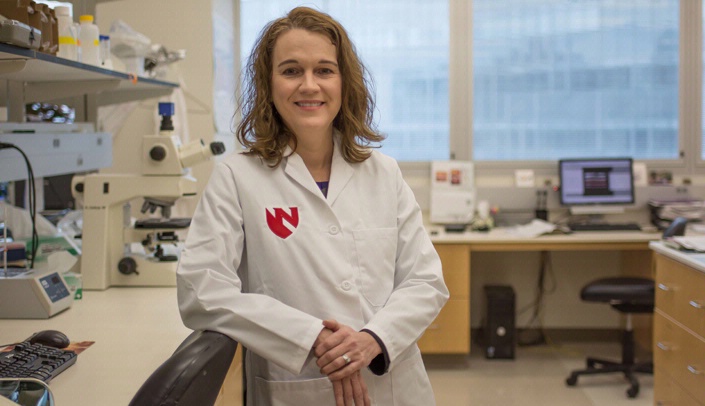Today, Tammy Kielian, Ph.D., Kommineni Professor of Pathology, will be honored as UNMC’s 11th Scientist Laureate. It is the medical center’s highest honor for research.
A professor in the UNMC Department of Pathology and Microbiology, Dr. Kielian is known for her heroic fight against juvenile Batten disease. She began researching the rare, fatal neurodegenerative disorder when her young niece was diagnosed with the disease.
Dr. Kielian was struck by a PowerPoint slide one of her students had made. It showed the Grand Canyon. A chasm. On each side of it, the student had listed one of the research interests in Kielian’s lab.
On one side of the canyon, juvenile Batten disease; on the other, staphylococcal biofilm infections. Between them, this great, vast divide.
But, it turns out, not. They are united by focusing on the role that innate immunity plays in each disease. “United by an overarching interest in the immunological aspects of each disease,” Dr. Kielian said.
Dr. Kielian bridged that gap to get to juvenile Batten disease from staph when her niece was diagnosed. The result was a gene therapy, now licensed by a biopharmaceutical company, that has shown promise in preclinical study of animal models.
“Motor defects are reduced. The degree of inflammation is reduced. There is reduced pathology of the lysosome (the digestive system of the cell),” Dr. Kielian said.
The results were published in a recent edition of The Journal of Neuroscience. Dr. Kielian hopes it is pointed toward IND (Investigational New Drug) status, with a Phase I clinical trial for kids within sight.
For a deadly, devastating disease with no treatment or cure, it would be the breakthrough heard ’round the world.
But Dr. Kielian also never left staph research. She continues to investigate ways we can fight MRSA, the bacteria/infection that claims the lives of some 11,000-plus each year. And she’s doing it, again, by studying the immune response.
She’s working on a project with Pfizer, to help understand how immune responses are altered in patients undergoing hip and knee surgeries, which may make them more susceptible to infection.
And her lab identified an immune molecule that inadvertently promotes S. aureus biofilm survival by increasing the numbers of a suppressive immune cell. Her team was the first to link this suppressive immune cell as critical for promoting biofilm persistence. It’s now a hot topic in MRSA research.
This is what she does.

Congrats, Tammy! Fantastic recognition of your outstanding research!
This is amazing!! Congrats my old friend!! 🙂
Congratulations, Tammy!
Marilyn Smith